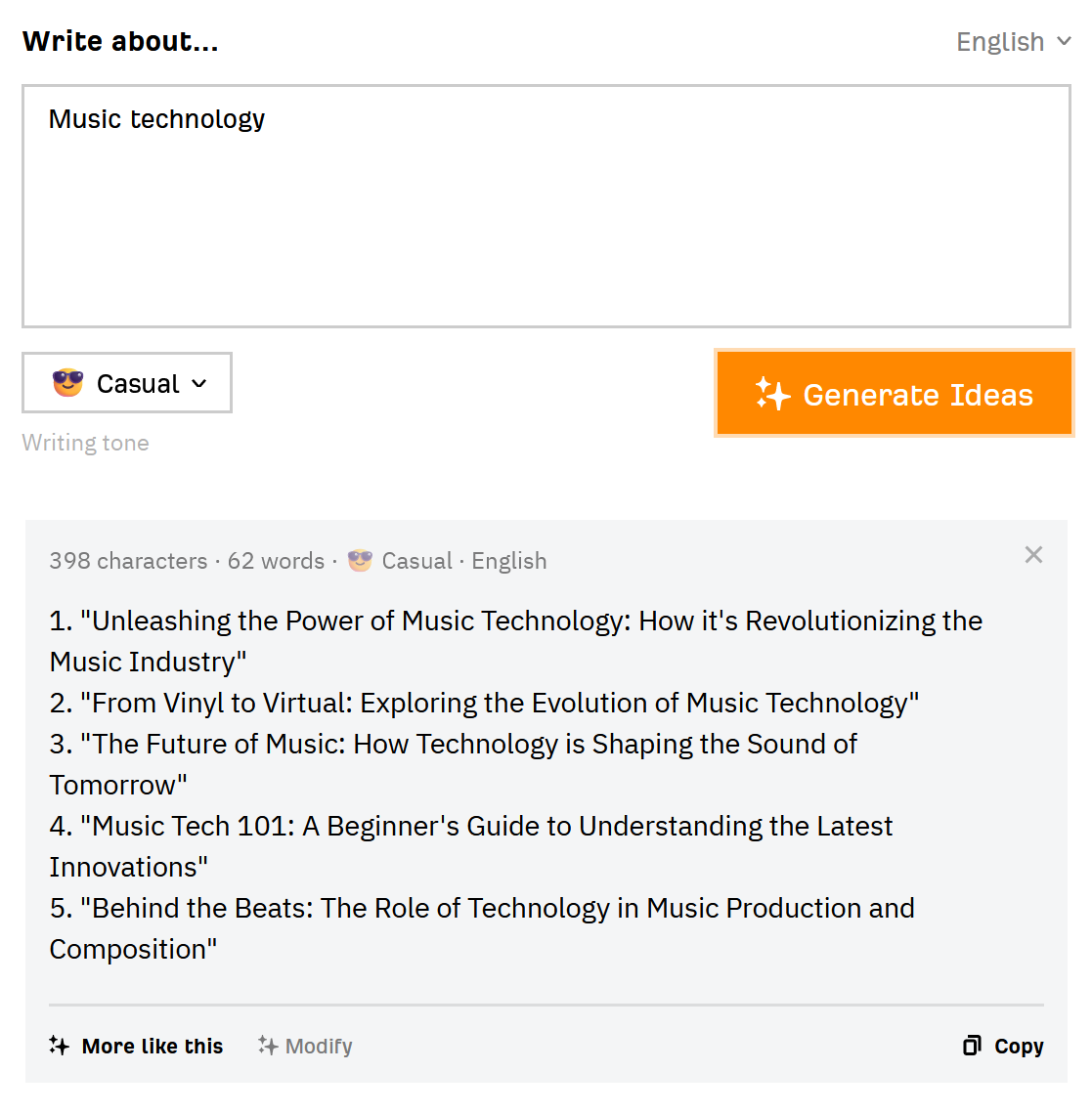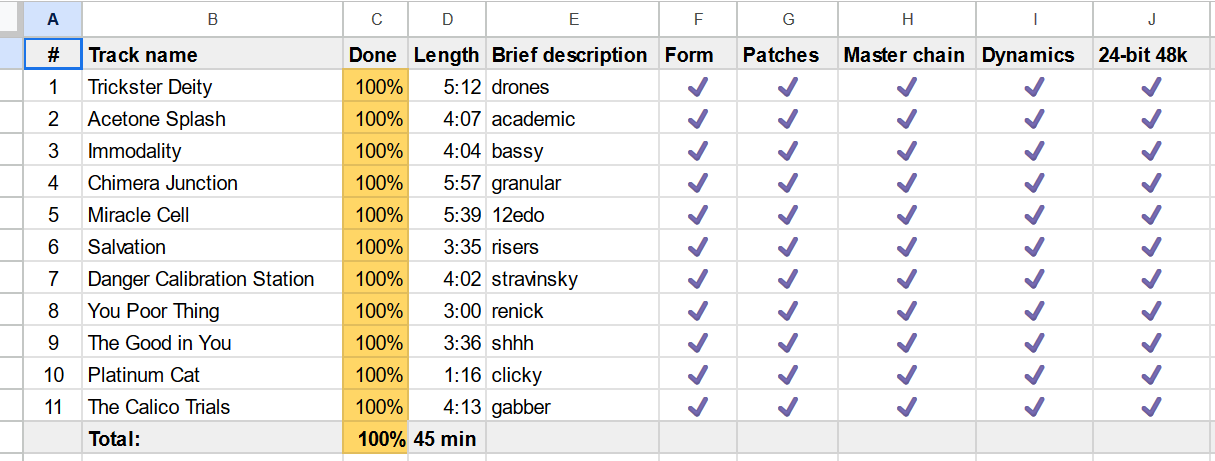State of the Blog, 2023
As 2023 ends, it seems like a good time to reflect and allow myself some vanity. It’s also a few days shy of the 15th anniversary of the first thing I created on the Internet (a certain wiki I have mentioned before). Amusingly, I’m really doing the same thing as I was back then: publicly writing about niche technical subjects. Back then it was mathematics, now music technology.
I set a goal for myself to release at least one substantial technical blog post every month this year, and succeeded:
Outside of writing, I also released a full-length album, began performing live, and gave some talks and guest lectures.
Meeting the monthly deadline required pushing myself a little, but I’m glad I set this schedule, because the self-imposed time constraints forced me to scope projects realistically and suppress perfectionism. Often all I needed to do for a blog post was to find an exciting topic and demonstrate its value with some nice sounds; there’s a time and place for thorough research and literature review, but I’m okay without it for most projects here. I also felt the variety is beneficial, since it helped me gauge my level of interest in various music tech topics and, more importantly, my audience’s. I don’t have analytics or a comment section, but I do hear from readers by email occasionally (thank you!), and this helps me understand what kind of writing is most wanted in the music tech community.
Speaking of engagement, now’s a good time as any to announce that I will be pivoting to topics suggested to me by this free online Blog Idea Generator:

While I expect the general topic to continue, I won’t try to hold myself to this schedule next year. This is so that I can shift towards a smaller number of projects that are more ambitious in scope. The goal I’m most jazzed about for 2024 is submitting an academic paper to a peer-reviewed conference as an independent researcher. I have a specific topic and a specific conference in mind, but I won’t discuss it until it’s in the reviewers’ mailbox.
Another big project I’m hoping to release is the Rust-based SuperCollider successor I’ve been building. While significant, it’s not as crazy as it sounds — my system is quite compact compared to SC, as it only replaces the small sliver of the platform that I personally use. A portion is already built and I’ve been using it in live performance, but it needs considerable refinement before others can use it.
I have some other projects lined up too. I have new music in the oven as usual, and I’ve been working sporadically on a mathematical visualization project.
Thoughts on creativity
I have been described as “prolific.” The main factors here are:
I have a naturally hyperactive personality and an overwhelming urge to make things.
I enjoy the privilege of supporting myself through freelancing, giving me a relaxed work schedule.
I slashed Internet surfing and phone use a few years ago, which helped my natural state shift over from consumption over to creativity.
Most of my social circle is creative types, and the element of social contagion is motivating, especially since I started connecting in person with the local art community.
I’m not a workaholic in any sense. My days are pretty relaxed and I go with the natural ebb and flow of my creative motivation. Between everything, I nap and watch YouTube and chat with friends and walk around outside (not at the same time).
I usually have one primary project going, one that I try to progress on regularly even when I don’t particularly feel like it. If I really run out of steam on the main project, I have a rotation of a few other secondary projects so I can stay stimulated. Some of these projects require intense focus, others are more low-key and leisurely, and it depends on how I’m feeling. I’m increasingly trying to incorporate computer-free projects into that rotation to reduce screen time while still fulfilling my creative needs. (I got into drawing and bookbinding recently.)
To avoid wandering between numerous unfinished projects and never completing any, I find it’s critical to give every project a definition of done. For software and informal scientific research, “completion” is a slippery concept, so I find that blog posts have been a consistently good way to give something a stamp of finality. I document my work, put it on the blog, send a celebratory email to the newsletter, and I can move on.
For music and other art forms, the definition of done is usually more straightforward, such as a release or a premiere. That doesn’t make the actual process of completing musical projects easy though.
Releasing an album
Multiple friends asked me about what the process is like for releasing an album. I feel I’m qualified to give an answer now that, well, I have an album out. I’ve discussed some aspects of the album musically, and I might do so more, but here I’m purely discussing logistics.
Haywire Frontier took about six months. I committed to making an album in February 2023, and I shipped off the premasters in August. Almost all tracks were started from scratch in that span, although “Acetone Splash” and “Immodality” started as earlier sketches. The work schedule was somewhat irregular. I’d have a week where I made a lot of progress, and a week where I didn’t touch the album at all. However, I tried not to initiate any other really big projects while the album was in progress.
Each of the tracks averaged about 3–6 hours of work total, usually split into one or two sessions where I composed and designed sounds, and one session dedicated to mixing and loudness. For me, it’s crucial to work as rapidly as possible, especially during the very first stages of a piece, because I get fatigued and frustrated if I chew on a single track for too long. (To get an idea of the pace that I work at, I’ve documented my compositional process extensively with session videos.) If I find myself spending a lot of time trying to “fix” a patch that doesn’t work, I let it go and try something else. I had a few such dead ends. The outro to “The Calico Trials” was originally much softer and prettier but didn’t hit the spot the way I wanted, and “The Good in You” was 90% rewritten, with only the title and the bookends retained.
A tool that proved invaluable for scaling the day-to-day production process up to a 40-minute musical project was this spreadsheet:

I just chipped away at this, checkmark by checkmark, until the album was done. The “Form” and “Patches” stages are a little amorphous and not necessarily in that order, but otherwise it’s left to right. A formula tracked the completion of the entire album, which was a nice little motivator. I bookmarked this Google Sheet in my browser toolbar so I couldn’t avoid the reminder that I had an album in the works.
Overall, my advice for tackling ambitious musical projects is to think like an accountant or project manager. If you’re down with agile or agile-like methods, use them. Really, go with any strategy that helps you take the musical process from liquid to solid, and break it into actionable chunks. It isn’t possible to decompose the entire creative process into an assembly line — we aren’t computers, after all — but these kinds of tools give us the peace of mind and help us focus on the actual artistry.
Finally, I’ve been asked about what it’s like to find a label. I’m not sure I can give useful advice here, since it’s a fickle process, and for better or worse mostly one of cronyism. I reached out and groveled to people who knew who I was (if you’re one of those people, I am very sorry, and thank you); many couldn’t help me but a few were kind enough to pass on demos, totaling five labels. I had this network in the first place not so much because of my music, but because of the audience for this blog and my contributions to SuperCollider.
It’s a common thread in the online experimental music community: quality sounds are still a requirement to get heard at all, but you really draw people in when you pull back the curtain and talk about processes and tools in a detailed manner. This wasn’t a strategic mastermind decision on my part, rather, I have always obsessively documented the technical side of my music, and it turns out people enjoy that. Process-sharing can also be taken to a cynical end, such as in the Synthfluencer–Industrial Complex, but that only makes it more important to try to build resources for electronic musicians that are genuine, thoughtful, and informative. If you make those kinds of resources, people will take notice and they’ll check out your music, too.
Writing, note-taking, organizational tools
I’m not quite sure how it happened, but at some point in the past few years I became an absolutely compulsive writer. I regularly open text files just to type and type and type. I just use Markdown files in Dropbox, with Obsidian as the editor. I have found no use for its linking or tagging features, I just prefer it to VSCode for editing text. Central to this repository is one long-running file, ideas.md, where I jot down anything that could develop into an interesting project. I go over it every now and then, reordering it to put the most tempting ideas near the top, pruning out anything that I’ve lost interest in.
I also carry a pen-and-paper journal around, and I write in it daily. Handwriting is inefficient for writing and editing text, so it’s intended more for personal reflection where efficiency doesn’t matter.
For reference management, I used a disorganized folder of PDFs for a long time, and I’m mad at myself for not picking up Zotero earlier. I definitely would have learned this had I gone to grad school, but alas I had to learn this the hard way.
For to-do lists, I use Trello, tracking all personal tasks, creative projects, and (non-NDA) freelance work on one huge board. If I divide my attention between multiple boards I will forget to look at one. My philosophy towards organizational tools is that they should be as simple and few in number as possible, and are only there to support the work.
I have little to say on the writing process itself, because it’s an atomic, indecomposable task. I just write, I’m not sure if I can explain it.
Conclusion
Maybe this is an interesting look behind the curtain, maybe this comes off as pompous self-indulgent rambling, I don’t know. In any case, I appreciate all who pay any attention to what I’m doing.